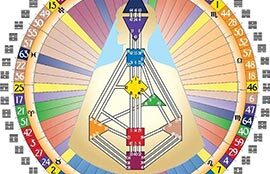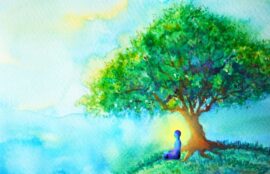“The nuclear and space age that we live in encourages the vigorous progress of science. But man has increasingly become obsessed with science and machines and lost touch with his essential humanity. Zen works to check this estrangement and restore intensity of awareness. If we know ourselves at all times, truth is where we stand, Rinzai said. Each morning Zuigan called: The Self! The Self! Yes, yes, he answered. He also said: Don’t ever let others condition you.”
— Masunaga Reihō
“Conditioning” is a term with countless applications, from love to athletics to politics. Today I want to spend a bit of time exploring what this idea of conditioning is, where it comes from, and how it applies to Zen practice. The word ‘condition’ itself goes all the way back to the Latin condicio, which translates to ‘agreement’. What is an agreement? It’s a collective decision in which two or more parties come to some sort of concession. An agreement exists, by nature, to benefit multiple sides at the expense of the total control of one side. The opposite of this is coercion, in which one party uses force to achieve what they want. An agreement or condition is a sort of stipulation by which multiple sides concede to less so they can all have some.
Now, let’s zoom out a bit more and stop indulging in Political Science 101 — what is ‘cultural conditioning’? It’s a loaded term, first of all. We’re so lost as moderners that people sometimes even try use the term to try to convince others that vastly complicated concepts like race, gender or culture “aren’t real”. This is completely missing the point. To fight against cultural conditioning when it’s a fact of history doesn’t solve the problem. If we want to actually mindfully understand who we think we are, who we actually are, and why the dissonance between the two causes so many social problems and anxiety, we have to, again, ask what is this thing? What is cultural conditioning? And, in this case, how does this relate to Zen, meditation, and mindfulness? When we reflect consciously on this, we stop denying ourselves the peace that comes from true understanding.
Given the prior definitions of conditioning, agreement and stipulation, cultural conditioning is when a given society says to an individual: “If you have it your way, there’s chaos. If I have it my way, there’s absolutism. Let’s meet somewhere in the middle.” This is why people aren’t allowed to act like beasts. It’s why rules, manners and politeness exist. But it’s also why many people today are confused. Why can’t they have their cake and eat it too? Because in being born into a given community, you enter into an agreement in which you agree to behave in exchange for a certain degree of security and belonging. This happens in nations, states, houses, workplaces, even at cafeteria tables or in cars on road trips. Every social situation or group dynamic represents a concession that, at least in theory, causes the least amount of conflict for each side.
This is where we run into trouble with culture. Culture affects how you deal with others, sure. ‘Cultural conditioning’ is a layer of behavior that you adopt against your primal nature as a man or woman of X or Y background in order to get along better in a given society with given ideals. This is what we all do. But this conditioning is more complicated than a simple interpersonal agreement because it affects your perception of yourself. Most people are not prone to reflection; they believe their conditioning, whatever it is, to be their identity. They cannot divorce the self from the spirit, or either of these from the ego. As always, where the ego rules, truth becomes a distant fiction.
Enter from stage left— meditation practice. Over time, your practice allows you to peel away the countless layers of confusing self-effacing cultural conditioning you’ve been carrying around for decades and simply exist as a spirit, without a body, without a mind. You can sit and be. This practice of reflection and mindfulness pushes you beyond the mere confines of your humanity and all of your cultural conditioning. It allows you to communicate with a higher authority. Don’t think of this as a God but more as the underlying depth and universal truth of nature. It does emerge eventually. And it’s very, very convincing.
Over time, this obviously changes you. I walk around New York and wonder how many people identify with their clothes, their affects, their appearance, the books they read, the music they listen to, the company they keep. This isall cultural conditioning. How many decisions do people make with petty external motivations that they misconstrue as their own? Overcoming this vanity requires contacting your deeper self. In Zen this is referred to as the ‘true self’. You want to move past the self you think you know and simply let the real self emerge. With this emergence comes strength. With this strength comes a desire to know reality as it is, to abandon ideologies, conditioning and concepts and to cultivate a sense of truth based on deep inborn intuition. Here is the essence of mindfulness.
Finally, doing this helps cultivate the compassion that so many petty cultural ideologies on every quadrant of the political, social and psychological spectrums try to instill in their blind-leading-the-blind adherents. Instead of loving people conditionally, based on how disenfranchised, ideological, open-minded or appealing they are, you love them based on the recognition that they too have access to the world of the spirit. Everyone has access to the true self should they choose to uncover it. We’re united by this inborn wisdom. We just feel so alienated from one another because large groups of people are never very smart. They rarely reflect and they certainly will take plenty of coaxing to look within themselves for even just 20 or 30 minutes a day. As a result, reconditioning yourself requires you to make an agreement with yourself— you will trade some of your self-indulgent whims and ideologies for a certain amount of silence and peace each day. This adds harmony to your life.
Cultivating the true self in such a way helps you see yourself for what you are and subsequently the world for what it is from the perspective of that self and beyond. Your actions harmonize with your thoughts. Your thoughts harmonize with your feelings. A greater balance is achieved. From this balance, a way of life that makes natural sense emerges. It’s a way of life with purposeless purposefulness rooted in simple action without fear. It is the essence of “just doing”. Just sit. Just reflect. Just let it happen.
 Charlie Ambler is the creator of The Daily Zen and @dailyzen on Twitter. He began the site in 2008 as a way to chronicle his study of Zen and practice of meditation. He is currently working on raising enough funding to work on Daily Zen full-time and is also writing a book about Zen practice and contemporary life. Charlie live in Greenpoint, Brooklyn and enjoys playing drums, walking, and petting other peoples’ dogs. You can support his work by clicking here.
Charlie Ambler is the creator of The Daily Zen and @dailyzen on Twitter. He began the site in 2008 as a way to chronicle his study of Zen and practice of meditation. He is currently working on raising enough funding to work on Daily Zen full-time and is also writing a book about Zen practice and contemporary life. Charlie live in Greenpoint, Brooklyn and enjoys playing drums, walking, and petting other peoples’ dogs. You can support his work by clicking here.






















Sorry, the comment form is closed at this time.